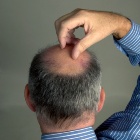Itching is a tingling or uneasy irritation of the skin that makes you want to scratch the affected area. When itching is generalized and persistent, medical help may be needed to determine and treat the cause.
 Generalized itch, for obvious reasons, is more difficult to treat. Itches can also occur with or without skin lesions (e.g., bumps or blisters). An uncomfortable sensation in the skin that feels as if something is crawling on the skin or in the skin, and makes the person want to scratch the affected area. Dry skin, especially in older people, can cause generalized itching. In some women during the later months of pregnancy, itching may occur without any skin lesions. Many drugs, including barbiturates (sleeping pills), can cause itching.
Generalized itch, for obvious reasons, is more difficult to treat. Itches can also occur with or without skin lesions (e.g., bumps or blisters). An uncomfortable sensation in the skin that feels as if something is crawling on the skin or in the skin, and makes the person want to scratch the affected area. Dry skin, especially in older people, can cause generalized itching. In some women during the later months of pregnancy, itching may occur without any skin lesions. Many drugs, including barbiturates (sleeping pills), can cause itching.
The treatment of pruritus is based on the identification of the cause, insofar as that is possible. Your dermatologist will ask you to be as specific as possible about such questions as: When do you itch – morning, evening, all day, etc? Where do you itch? Are there identifiable events that trigger your itching? How much and how deeply do you scratch? Do you perceive your itching as a major problem that must be relieved?
For very dry hands, try this for a night: Apply a thin layer of petroleum jelly, and wear thin cotton gloves to bed.
Specific treatment of itching depends on the underlying condition that causes it. In general, itchy skin should be treated very gently. While scratching may temporarily ease the itch, in the long run scratching just makes it worse. In addition, scratching can lead to an endless cycle of itch—scratch—more itching.
The seeds of the butea have excellent effects in controlling itching caused due to a variety of skin diseases such as ringworm, scabies and eczema. It can also cure boils, pimples and swellings that itch. For better results, these seeds are ground and mixed with lemon juice and used as an external application on the affected part.
Linseed is a good household remedy for itching. A hot poultice of its seeds is applied on the affected part.
Medications also may be part of your treatment plan. An over-the-counter (OTC) cream or ointment containing hydrocortisone (Cortaid, Preparation H), applied sparingly to the affected area may reduce inflammation and itching. A protective ointment that contains zinc oxide (Desitin, Balmex) also may help. If your symptoms are worse at night, your doctor may also prescribe an antihistamine to reduce itching until topical treatments take effect. With proper treatment, most people experience complete relief from anal itching in less than a month.
Soothing baths can also help with itchy skin. Try using bath additives like oils, milks, clays, and baking soda to soothe itch. Avoid salts and other drying bath additives, which will leave the skin feeling like a dry, crackling mask. Oatmeal baths will also help to soothe itchy skin and leave the skin firmer and healthier as well. Keep soothing baths tepid, rather than hot, and remember to gently pat, not rub, dry and moisturize afterwards.
What skin itching treatment can people choose in other cases of irritating skin itching? First, try not to scratch; the less damaging remedy for you can be rubbing in some soothing cream. The most appropriate creams are those containing camphor or menthol. For some time you should avoid wool against your skin till itching is gone. Remember that skin itching becomes more annoying when you are warm. So, don't overdress, try to keep cool. Many doctors advice taking cool shower or just applying cool compress on the affected body area.
Article courtesy of Corwin Brown









Join the Discussion
Type out your comment here:
You must be logged in to post a comment.